- Home
- Evelyn James
The Valentine Murder
The Valentine Murder Read online
The Valentine Murder
A Clara Fitzgerald Mystery
Book 20
By
Evelyn James
Red Raven Publications
2020
© Evelyn James 2020
First published 2020
Red Raven Publications
The right of Evelyn James to be identified as the Author of this work has been asserted in accordance with the Copyrights, Designs and Patents Act 1988.
All rights reserved. No part of this book may be reprinted or reproduced or utilised in any form or by any electronic, mechanical or other means, now known or hereafter invented, including photocopying and recording, or in any information storage or retrieval system without the permission in writing from the author
The Valentine Murder is the twentieth book in the Clara Fitzgerald series
Other titles in the Series:
Memories of the Dead
Flight of Fancy
Murder in Mink
Carnival of Criminals
Mistletoe and Murder
The Poisoned Pen
Grave Suspicions of Murder
The Woman Died Thrice
Murder and Mascara
The Green Jade Dragon
The Monster at the Window
Murder on the Mary Jane
The Missing Wife
The Traitor’s Bones
The Fossil Murder
Mr Lynch’s Prophecy
Death at the Pantomime
The Cowboy’s Crime
The Trouble with Tortoises
Contents
Chapter One
Chapter Two
Chapter Three
Chapter Four
Chapter Five
Chapter Six
Chapter Seven
Chapter Eight
Chapter Nine
Chapter Ten
Chapter Eleven
Chapter Twelve
Chapter Thirteen
Chapter Fourteen
Chapter Fifteen
Chapter Sixteen
Chapter Seventeen
Chapter Eighteen
Chapter Nineteen
Chapter Twenty
Chapter Twenty-One
Chapter Twenty-Two
Chapter Twenty-Three
Chapter Twenty-Four
Chapter Twenty-Five
Chapter Twenty-Six
Chapter Twenty-Seven
Chapter Twenty-Eight
Chapter Twenty-Nine
Chapter One
“And that wraps up the mystery of the missing right shoe,” Clara completed the sentence on the paper and looked at it with a hint of disappointment – there was something unbecoming about a private detective hunting down a misplaced piece of footwear when she was known for solving dastardly crimes, such as murder. Admittedly, it had been a rather peaceful case, compared to her usual dramas. No one had attempted to kill her, and her clients had paid well for the return of the lost item (a rather expensive leather dress shoe bought to be worn at a wedding). She hoped they would not be disgruntled that the thief had proven to be the household tabby cat, who had suddenly developed a shoe fetish.
Clara kept a written record of all her cases, no matter how mundane, out of a sense of thoroughness and because on occasion she found it useful to look back at them. Even the ones that seemed beneath her abilities. What were missing shoes compared to murder? Oh, but she supposed to the person involved they could almost seem just as important. She could think of a few people who would put a missing item over a dead body every day. Perhaps she should not be so surprised. In any event, it was the little, boring cases that paid the bills and it was better than people getting killed left, right and centre.
Clara stood up from the table in the parlour and stretched her arms over her head, easing her shoulders that were stiff from writing. After the events just before Christmas, she had been hoping for a quiet spell to give her a chance to relax and unwind. To enjoy life with her family and dear Captain O’Harris for a bit. As the old adage goes, be careful what you wish for. Clara had certainly appreciated the peacefulness of a Christmas without any crimes to solve, but once she was a week into January, she was wretchedly bored and was jumping at any case to pass the time. So far, 1923 had offered her the mystery of the missing newspaper sandwich board (borrowed by local boys to use as a sled in the snow), the vandalising of the Brighton Christmas tree (turned out to be a pair of seagulls who had taken offence at the shiny baubles) and the disappearance of Mrs Gill’s right shoe. All of which Clara had solved within a couple of days. It always amazed her how unobservant people were in general. It only took a little effort and they could have solved these matters for themselves. Not that she was complaining. The electricity bill needed paying, after all, and a case was a case.
She just was starting to crave something a bit more… lively.
Tommy bundled in through the front door, stamping wet slush off his feet, while a very damp Bramble ran into the parlour and leapt up at Clara.
“Down boy!” She informed him sternly, which command the small black poodle took no heed of whatsoever.
“Brisk out there!” Tommy informed her as he unwrapped his scarf from his neck.
Tommy was Clara’s older brother and her partner in the detective business, though she was still prone to forgetting that and going off on her own. She had always been very independent and found it hard to work with someone else, even her own kin.
“If Mrs Gill thinks she will be wearing those shoes of hers to her daughter’s wedding, she must either be very brave or very foolish. They will be ruined by the snow and she shall have to abide with soggy feet through the whole affair,” Tommy added. He had taken a back seat in the shoe case, but he had heard all the details.
“I think Mrs Gill is not concerned about practical footwear, rather she is interested in what her shoes look like,” Clara replied. “Which is quite often the case at weddings. When is the last time you saw a bride turn up to a winter wedding in wellies? No matter the season, brides will always wear those little ballet slipper type shoes. Impractical in summer, let alone an English winter.”
As Clara spoke, the heavens obligingly opened, and rain started to pour down. She waved a hand at the window as if the weather had deliberately made her point.
“In other news,” Tommy said, sitting in an armchair and lifting his right leg so he could bend the knee up and down. Tommy had been injured in the war and his legs often became stiff, especially in the cold, “I saw the police heading out somewhere rather urgently. Looked like they were off to Hove. They took the police car and Dr Deáth was in his coroner’s van. Seemed serious.”
The police station only had one car, a solitary black vehicle that all the constables fought over to drive when the opportunity arose, which was not often. That Dr Deáth had also been driving out suggested they expected a body.
“Oh dear,” Clara said, gazing out the window.
The cold weather brought a lot of sad deaths; unfortunate individuals who found themselves out on the streets freezing to death, even some poor souls who had a roof over their heads but no coal for a fire. Most of those cases were not considered suspicious, but the police would have to attend anyway before the coroner could remove the body. Maybe that was all that had happened – an old tramp found frozen solid in some forgotten barn.
Tommy was about to say something else when Annie appeared in the parlour. She was pinning her hat on her head.
“Just to let you know, you shall have to be responsible for your own suppers,” she said.
This came as such a surprise to both Tommy and Clara that they both responded in unison.
“Is everything alright?”
“Are y
ou unwell?”
In the time Annie had served as the Fitzgeralds’ housekeeper, only very rarely had she been unable to cook dinner. Annie prided herself on her culinary talents and would not allow anyone else to interfere with her kitchen arrangements unless it was absolutely necessary.
“I am perfectly well,” Annie told them plainly. “But I have received a letter from my old friend Ellen at the farm. She is in desperate straits. Her husband has gone down with Spanish influenza and she has just had twins, not to mention she has a toddler running about. Trying to recuperate from the birth and nurse her husband at the same time is proving too much. She has asked if I would help her out.”
“You’ve never mentioned Ellen before,” Tommy observed, wondering why a person he had never heard of was suddenly asking for Annie’s assistance.
“I don’t suppose you have told me of all your friends, Tommy,” Annie said. “Besides, we only write to one another these days, weekly mind, but she is so busy at the farm and too far away for us to see each other regularly.”
“Who is taking care of the farm?” Clara asked.
“Ellen’s father,” Annie responded. “Her parents have their own small dairy, so her mother is going to remain at home and take care of their herd.”
“Be careful, Annie, Spanish ‘flu is nasty,” Tommy said with a worried voice.
“You need not fret,” Annie reassured him. “I am sure I am made of sterner stuff than influenza.”
She had finished pinning on her hat as if she was donning some sort of armour. If the perfect application of hat pins could keep flu at bay, then Annie was certainly safe.
“Hopefully, I shall be gone no more than a week,” Annie told them. “If you start to struggle, I suggest buying luncheon at one of the cafes or teashops just for the time being.”
“You really have no faith in our ability to cook,” Tommy said, aggrieved.
“I remember Clara’s attempt at boiling potatoes,” Annie retorted, casting her eyes at Clara with a despondent expression. “I dread to think what could occur while I am gone, but I have a friend in need, and I must go to her.”
Annie adjusted her hat unnecessarily.
“I’m off to catch the bus. Don’t let Bramble in the pantry, he has figured out how to climb the shelves and reach the eggs.”
With this final instruction, Annie sallied out of the house and off on her mission of mercy.
“Well,” said Clara.
“Well,” said Tommy.
They both stared out of the window for a bit. Then Tommy brightened.
“I say, let’s cook a curry! Annie never lets us have curry. She says she can’t stand the spices.”
“I think she hates the yellow stain turmeric leaves on everything it touches,” Clara said. “Still, I’m game if you are game.”
They headed into the kitchen to explore the cupboards and see if they had anything that could be transformed into curry. Annie had a tendency to dispose of spices she deemed overly exotic and, therefore, irrelevant to her cooking. They found some curry powder tucked up a dark corner of a shelf, by chance overlooked by their housekeeper and friend. Tommy retrieved it and after some more searching they came up with a modest assortment of ingredients that could, with a stretch of the imagination, be turned into a curry.
“She shall never know, yes?” Tommy turned to his sister with a worried look in his eye.
“She shall never know,” Clara promised.
They were about to begin work when the doorbell went. Clara departed to answer it. She found on her doorstep a worried looking Oliver Bankes.
Oliver was a local photographer who also worked part time for the police, taking pictures of crime scenes for them. From the damp appearance of his trousers and jacket, Clara surmised he had just been out taking pictures. His heavy camera was in a box around his neck and he still had his tripod clutched in his right hand.
“Clara,” he greeted her as she opened the door, “I had to come see you. Something very strange has just happened.”
Clara stood back and ushered him inside and to the kitchen. She placed a chair close to the stove and sat him down to warm up. Tommy offered to take the tripod and camera, and Oliver relinquished them without a murmur, which was somewhat unusual for the photographer who it was normally impossible to prise his beloved camera from. He seemed in a state of shock and Clara set to work making a pot of tea, following Annie’s mantra that warm sweet tea was the cure for everything that ailed a person.
“I am assuming you have been out with the police,” Tommy said.
“How did you know?” Oliver asked in an oddly dull tone.
“I saw the Inspector driving off and Dr Deáth behind him. Looked like something important.”
“A body was found early this morning,” Oliver nodded. “An old man lying by a hedge. A police constable in Hove reported it, and Inspector Park-Coombs rang for me to get over there as soon as I could with a camera. Naturally, I did not have transport, but Dr Deáth allowed me to go in the back of his van.”
Oliver was looking queasy. Clara wished the kettle would hurry up and boil.
“The dead man was in a field where he had been working the previous day, cutting hedges. I was shown to the scene and told to take as many photographs as I could of the body and then the ground around it, including a couple of footprints in the mud.”
“Then this was not a case of someone freezing to death?” Clara said grimly.
Oliver shook his head and licked his lips, his mouth dry and tasting like vomit, even though he had not been sick – not yet, anyway.
“I have seen some things,” Oliver groaned. “I never expected police photography to be a pleasant task, but this was something else. The poor old boy had had his throat slit with a slashing hook, the very one he had used to trim the hedge, then he had been pinned to the ground by a pitchfork through his shoulders and neck. Someone had wedged the pitchfork into the hedge as if they were trying to make sure he could not get away. It was horrid, horrid.”
Oliver’s face had gone a pale white as he recounted what he had witnessed. Tommy and Clara fell into stunned silence, contemplating what they had just heard and only being jerked from their thoughts by the irate whistling of the kettle. Clara hastened to make tea.
“That is… pretty awful,” Tommy said when it seemed time to say something. “What could the old man have done to warrant that?”
“He had made someone pretty angry,” Clara said.
“Or there is a lunatic running about in Hove,” Tommy shuddered. “Wait, Annie is headed to Hove!”
“Hove is a big place,” Clara hastened to remind him.
“But she will be out on some lonely farm and this madman is on the loose!” Tommy was working himself up into a state.
Clara went to calm him down.
“It is far more likely that the old man knew his killer. It was someone with a grievance against him, and a drop more beer in his belly than he should have had. It is dreadful, and unspeakably evil, but the police will figure out who is responsible soon enough.”
Tommy was pacing and did not look appeased.
“I haven’t told you the worst of it,” Oliver said, his shivering seeming to be increasing rather than the opposite. Clara suspected he was suffering shock.
“There is worse?” She said incredulously. “Isn’t a poor old man brutally hacked to death bad enough?”
“It’s what people were saying at the crime scene that really made me tremble,” Oliver insisted. “A couple of locals found him, and they reported it to their local bobby. You know how these things go, before long there was a crowd of people about the place, all looking on and I could hear them talking. I was trying not to listen, but I could not help it.”
“I’m guessing you didn’t like what they were saying,” Clara said, knowing that the speculations people made at the sight of a murder were usually nothing to take seriously. People spoke a lot of nonsense about these things.
“Clara, I know you th
ink I have a fanciful mind, after that business with the dead man who rose up from his tomb, but who was not really dead,” Oliver continued. “I appreciate I was wrong on that one, but this is different. This is more…”
Oliver didn’t know what it was more like, but he did know he felt there was something behind what he had heard people saying.
“They were calling it a witchcraft killing, Clara,” he said urgently. “They said it was a ritual killing.”
Chapter Two
“That’s it, I’m going to Hove,” Tommy said ardently, starting to stride into the corridor for his coat. “Annie could be in grave danger.”
“Look, you two,” Clara stopped him, gazing from her brother to Oliver. “Let’s just be sensible for a moment. Witchcraft? There is no such thing.”
“There have always been witches,” Oliver countered. “Women who thought they could lay the evil eye on someone, or cast weather spells, men too. I don’t say they could really do magic, I am not that daft, but my point is not that we believe witchcraft is real, its that other people think it might be real and will commit cruel crimes as a result.”
Clara had to concede that he had a point, there were still plenty of people even in the civilised and fairly modern town of Brighton who firmly believed a correctly hung horseshoe brought luck, or that you could read someone’s fortune in tea leaves. Annie had a fair few superstitions of her own; if she spilt salt, she always threw a pinch over her shoulder into the Devil’s eye, and if the chickens stopped laying, she insisted a storm was coming. There were no doubt countless habits she did out of superstition that they did not even know about, and which were so automatic to her she never gave them a second thought.
Clara was not personally inclined to such antics, but that did not mean she should ignore them in other people or ignore what those beliefs could lead them to do. People killed each other over mistaken beliefs all the time.
“All right,” Clara said. “Supposing someone has killed this man because he was somehow involved in witchcraft, as motives go for murder it is no more far-fetched than killing someone for their loose change, or because you thought they were sleeping with your wife, but that does not mean a madman is on the loose.”

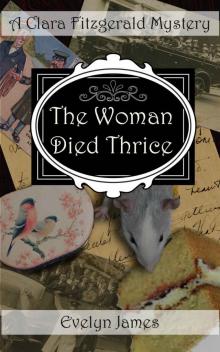 The Woman Died Thrice
The Woman Died Thrice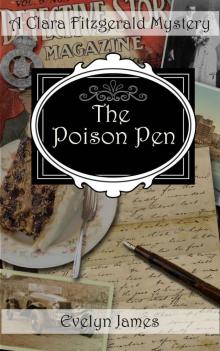 The Poison Pen
The Poison Pen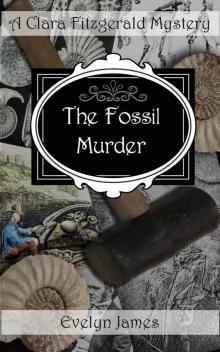 The Fossil Murder
The Fossil Murder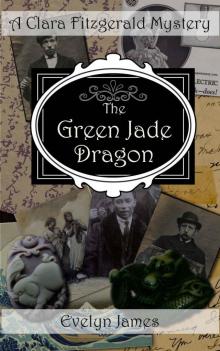 The Green Jade Dragon
The Green Jade Dragon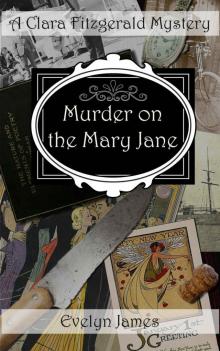 Murder on the Mary Jane
Murder on the Mary Jane Murder and Mascara
Murder and Mascara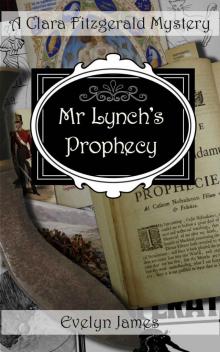 Mr Lynch's Prophecy
Mr Lynch's Prophecy The Traitor's Bones
The Traitor's Bones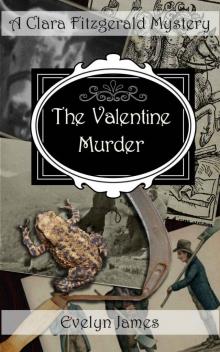 The Valentine Murder
The Valentine Murder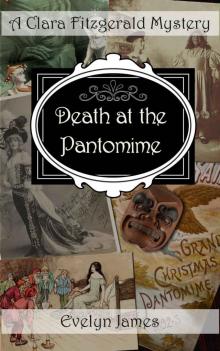 Death at the Pantomime
Death at the Pantomime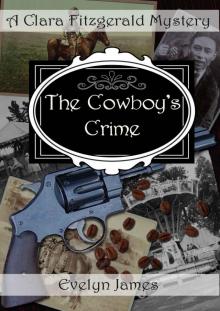 The Cowboy's Crime
The Cowboy's Crime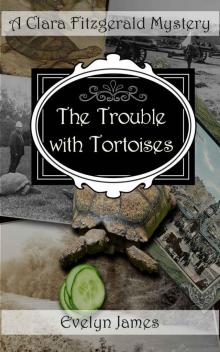 The Trouble With Tortoises
The Trouble With Tortoises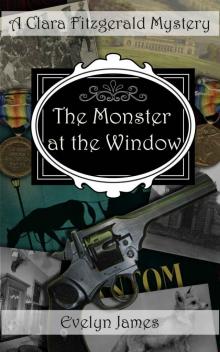 The Monster at the Window
The Monster at the Window